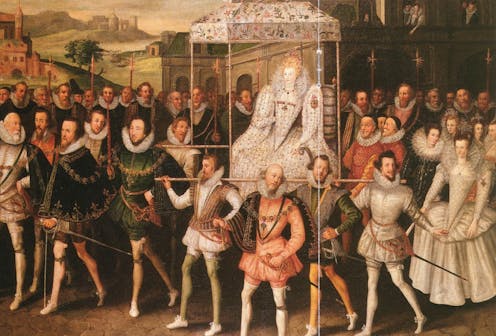How Elizabethan law once protected the poor from the high cost of living – and led to unrivalled economic prosperity
- Written by Simon Szreter, Professor of History and Public Policy, University of Cambridge

In the closing years of Elizabeth I’s reign, England saw the emergence of arguably the world’s first effective welfare state. Laws were established which successfully protected people from rises in food prices.
More than 400 years later, in the closing years of Elizabeth II’s reign[1], the UK once again faces perilous spikes in living costs. Perhaps today’s government could learn something from its legislative ancestors.
Until the end of the 16th century, it was a given throughout medieval Europe that when food prices rose there would be a consequent surge in mortality rates, as people starved to death and diseases spread among the malnourished.
The Elizabethan Poor Laws[2] of 1598 and 1601 turned the situation in England on its head. Now when food became too expensive, local parishes were obliged to give cash or food to those who could not afford to eat. For the first time in history[3], it became illegal to let anybody starve.
The laws were clear and simple, and required each of over 10,000 English parishes to set up a continuous relief fund to support the vulnerable. This included the lame, the ill and the old, as well as orphans, widows, single mothers and their children, and those unable to find work. Occupiers of land (landowners or their tenants) had to pay a tax towards the fund in proportion to the value of their holding.
Overseen by local magistrates, the system’s transparency provided no loopholes for avoiding the tax. In fact, it encouraged a flourishing culture of charitable giving which provided almshouses, apprenticeships and hospitals for the parish poor to alleviate destitution.
With this proliferation of localised mini-welfare states, England became the first country in Europe by more than 150 years to effectively put an end to widespread famine[4]. And it also enabled England subsequently to enjoy by far the fastest rate of urbanisation in Europe.
Between 1600 and 1800, huge numbers of young people left rural parishes to find work in cities, safe in the knowledge that their parents would be supported by the parish in times of need – and that they themselves would receive help if things didn’t work out. Long before the first steam engines arrived, the Poor Laws had created an urban workforce which enabled the industrial revolution to take off.
Then in 1834, everything changed. The cost of this level of welfare support was deemed too high, and replaced with a deliberately harsh new system[5] in which the poorest men and women were separated from each other and their children and provided only with gruel in return for tedious chores in degrading workhouses. The fear of the workhouse was designed to force the poor to prefer work – for whatever abysmal wages the market offered.
It is this version of the Poor Laws which tends to stick in the popular memory, familiar from the books of Charles Dickens, and obscuring the achievements of the Elizabethan original. But extensive[6] recent[7] research[8] has started to highlight how Elizabethan law changed British history – and provides us with urgent lessons for today’s welfare system and the pressures of the cost-of-living crisis.
Just as the old Poor Laws supported an extraordinary period of economic prosperity, so too did the UK’s welfare state after the second world war. Tax-funded investment in education (secondary and higher), and the newly-created NHS saw widened opportunities and living standards take off, as the UK enjoyed over two decades of the fastest productivity growth[9] in its history (1951-73).
Today, people regularly speak of being forced to choose between eating and heating[11] as food and energy prices surge. Yet there is no corresponding compensation for those whose wages and benefits do not stretch far enough. A one-off hand out[12] when millions of households are facing both fuel and food poverty is but a temporary sticking plaster.
Until there is a permanent increase in safety net payments to those on universal credit, food banks will continue to proliferate and children will continue to go to school hungry. The link between wealth and taxation was effectively used by the Elizabethans to start to tackle inequality. But today’s globalised economy facilitates offshore profits and ever-rising inequality.
In my new book, After the Virus: Lessons from the Past for a Better Future[13] I explore changes in the sense of moral duty and the carefully legislated collective endeavour that formed the foundation of the UK’s past – and most recent – periods of prosperity.
The Poor Laws were far from a perfect system of welfare. But the fact that protecting the poorest in society has previously led to widespread economic growth is a history lesson that should not be ignored by any government during a cost-of-living crisis.
References
- ^ Elizabeth II’s reign (www.britannica.com)
- ^ Elizabethan Poor Laws (www.cambridge.org)
- ^ first time in history (www.waterstones.com)
- ^ end to widespread famine (www.cambridge.org)
- ^ harsh new system (www.cambridge.org)
- ^ extensive (academic.oup.com)
- ^ recent (academic.oup.com)
- ^ research (www.cambridge.org)
- ^ fastest productivity growth (www.cambridge.org)
- ^ Shutterstock/Yau Ming Low (www.shutterstock.com)
- ^ eating and heating (metro.co.uk)
- ^ hand out (theconversation.com)
- ^ After the Virus: Lessons from the Past for a Better Future (www.cambridge.org)







